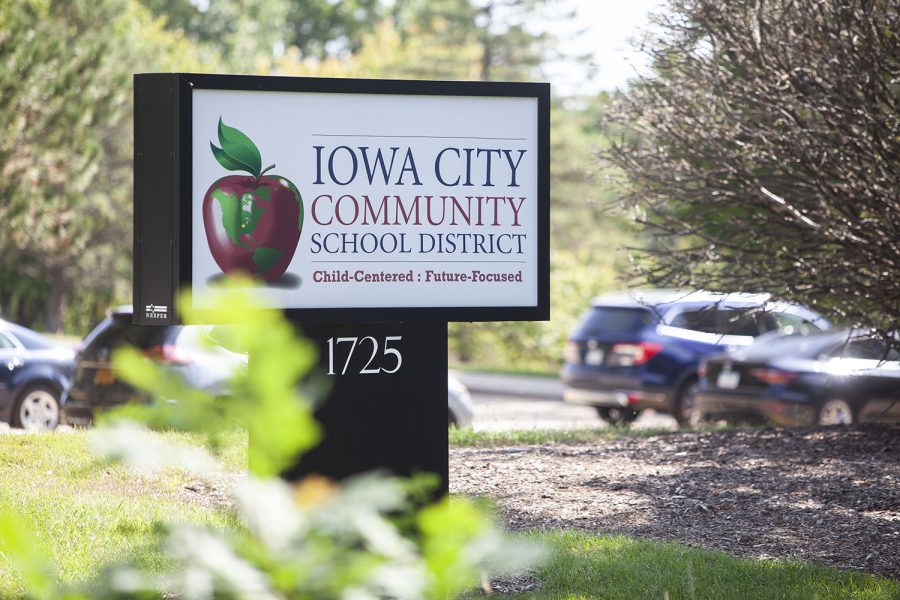Iowa City school board members voice concern for public school funding after the passage of Students First Act
The bill’s recent passage in the Iowa Legislature leaves Iowa City Community School District Board Members concerned about the future of public schools.
The Iowa City Community School District sign in Iowa City is seen on Tuesday, Sept. 13, 2022.
January 29, 2023
Following the recent enactment of the Students First Act, some Iowa City Community School District Board members are concerned about the future of funding for public schools.
The new law, which was passed in the Iowa Legislature on Jan. 24 and signed into law later that morning, will use taxpayer money to fund private school student education through educational savings accounts.
The education savings accounts total $7,598 a year per private school student to spend on tuition and other education expenses. This is the same amount of state aid given to public schools per student, according to Gov. Kim Reynolds’ office.
Some school board members say this law signifies a shift in funding toward private institutions, which will leave public schools at a disadvantage.
“I think the best way to describe it is a profound disappointment,” Lisa Williams, school board vice president, said. “It’s really sad for me to witness this historic moment in Iowa.”
Iowa City School Board President Ruthina Malone said she is concerned about the law’s lack of transparency requirements for private schools, as private schools do not have to accept all students and use public funds.
“We accept any student that lives in our school zone,” Malone said. “They should be held to the same standards, and we should know what those standards are.”
Malone said there are disparities between urban and rural communities because there are fewer private schools in rural areas, and urban areas receive more funding.
“Chances are, we’ll see those schools hit hardest first,” Malone said. “There will be a lot more consolidation and/or elimination of those rural schools because they’re all fighting for the same number of students and the same amount of money.”
RELATED: Iowa City Community School District five-year strategic plan to increase proficiency in schools
School board member Maka Pilcher Hayek said education savings accounts do not cover the full tuition for private schools, so students of lower socioeconomic status will be unable to attend.
“Do you think that people that have low income, and in fact, middle income with a voucher of $7,600 can afford the rest of the tuition at these private schools? No,” Pilcher Hayek said.
“These vouchers aren’t going to help the masses. These vouchers are going to allow private — mostly Christian — schools to decide who they want to let in.”
According to a report from the Legislative Services Agency, about $345 million in taxpayer dollars will be spent on the education savings accounts after four years of the law’s installation.
Iowa City schools Superintendent Matt Degner critiqued the law via Twitter before its passage.
“Is this the most important thing for your state government to be working on? For example, why not make pre-school free for everyone instead?” he tweeted on Jan. 20.
As stated earlier the proposal costs $341 million dollars. There are 1.6 million tax returns filed in Iowa. Quick math shows that all of us will pay at least $200 on our Iowa tax returns to fund 33,000 students in private school and at most 10,000 more that may choose to do so.
— Matt Degner (@mwdegner) January 20, 2023
Williams said the law is a direct choice from lawmakers to stop supporting public education.
“We could have invested that huge sum of money into making our public schools stronger, but that’s not what they wanted to do. They want to channel that money into private institutions instead,” Williams said.
While this law focuses on private institutions, it will aid public schools by allowing increases in teacher salaries and removing certain teaching restrictions, according to the Office of the Governor.
The law includes $1,200 for schools per private school student in the district, even if they did not previously attend a public school.
But Williams believes more is needed.
“A lot of people who were in support of this bill would say the money should follow the student, but the operational costs of a school district, again, don’t change. They still cost the same,” Williams said. “… The $1,200 is an attempt to help, but it’s not going to be sufficient.”
As for the district, board members remain firm that the bill is not going to change the strength of public education.
“We have leadership that is going to double down its efforts to serve these kids when our state is sending messages to undermine the system that we have committed to,” Pilcher Hayek said. “We will remain the system that protects Iowa’s social fabric. We will remain the entity that is committed to serving children and to ensuring that Iowa has a better future.”



